WMNST 580/MALAS 600B
Woman, Development, and the Global
Economy
Dr. Doreen Mattingly
Wednesday 4:00-6:40,
Adams Humanities 3110
Although women’s paid and unpaid labor is invisible in many
theories and descriptions of politics, economics, and geography, women are, in
fact, central actors in economic development and political change. In this course we will examine the connection
between women’s lives and economic change.
To do so, we will look at theory, descriptions, and the “real
world.” From the vantage point of
women’s lives, we will also question what is meant by “economic development”
and “globalization.” We will analyze the
effect of these processes on women’s lives, as well as the ways women have
shaped and challenged national and international economic processes.
Learning outcomes:
·
Demonstrate an understanding of conflicting
ideas of development and globalization.
·
Explain how economic and legal structures affect
women’s opportunities
·
Contrast the position of women in different
countries
·
Articulate a way of looking at the world from
the standpoint of diverse women internationally
·
Analyze feminist debates about development and
empowerment
Dr. Doreen Mattingly is Professor and Chair of Women’s Studies. Since coming to SDSU in 1995, she has taught a total of sixteen different courses, including her popular classes on women and politics, women’s movements and activism, and globalization and development. In 2016 she was the recipient of the College of Arts and Letters Excellence in Teaching Award. Her most recent book, A Feminist in the White House: Midge Costanza, the Carter Years, and America’s Culture Wars (New York: Oxford University Press, 2016), chronicles the political career of a feminist who served as assistant to the president for public liaison under President Jimmy Carter. Dr. Mattingly’s current research investigates the California feminist movement of the 1970s, especially in its engagement with political institutions. Behind the scenes, Dr. Mattingly serves the university as the Vice President of the SDSU chapter of the California Faculty Association. She has been on the board of the Bread and Roses Center for Feminist Research and Activism at SDSU since 2014.
















